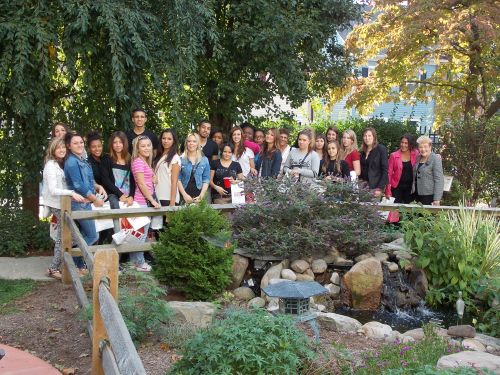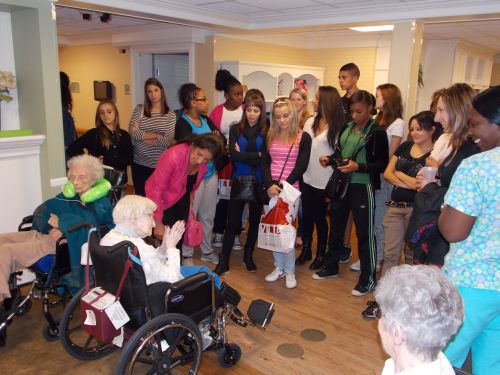Homeland Center residents’ Pearl Harbor memories resonate with college students
World War II took loved ones. It opened doors to opportunity, service, and sacrifice. It was a time when many Homeland residents matured quickly from children to adults, and it all started with the bombing of the U.S. Navy base at Pearl Harbor, Hawaii, on Dec. 7, 1941.
 On Dec. 7, 2015, Homeland Center residents gathered in the chapel to share memories of the “date which will live in infamy” with students from Central Penn College. The students then recalled the 9/11 attacks on the U.S., and the two generations bonded over the impact that national crises had on their lives.
On Dec. 7, 2015, Homeland Center residents gathered in the chapel to share memories of the “date which will live in infamy” with students from Central Penn College. The students then recalled the 9/11 attacks on the U.S., and the two generations bonded over the impact that national crises had on their lives.
“I was the first boy to be drafted from my school, and I finished,” said Homeland resident Don Englander. “I was one of the lucky ones.”
The Central Penn College students belonged to Rotaract, a Rotary Club initiative for 18-to-30-year-olds. The Homeland visit was the first community service project by the new club, sponsored by the Rotary Clubs of Harrisburg and Mechanicsburg North.
About a dozen residents shared their Pearl Harbor memories with seven students. Resident Harry Zimmerman was 13 years old, living in Harrisburg, when he heard newsboys outside, shouting about their extra editions.
“It was a different world back then,” he said. “We didn’t even have electricity.”
Vivian Black’s future husband, stationed at Pearl Harbor’s Hickam Field, first thought the planes droning overhead were “no big deal,” and he went back to sleep.
“Then they woke him up, and he was dressed in a couple of minutes and out on the field with the other soldiers,” Black said.
Arthur Lloyd, already in the service and attending radio school, was taking a break with his buddies, all wearing civilian clothes for a day at the skating rink. When they heard the news, he told his friends to enjoy their civvies, “because we’re going to be in uniform the rest of the war.”
One resident couldn’t finish her story, thinking of the brother she lost in the war. Another remembered her brother-in-law, who survived a naval attack off the coast of South America, only to lose his life on D-Day.
Rotaract Club President Mallar Peters, of Lake George, NY, said the emotional tug of Pearl Harbor resonated with him because 9/11 influenced his decision to enroll in Central Penn College’s homeland security program.
“I thought, ‘What can I do to help?’” he said to approving murmurs from the residents. “I thought that working in national security, helping with terrorist threats, would be a good career choice for me.”
After learning that one resident didn’t hear from loved ones in the service for six weeks after the Pearl Harbor attack, student Ashlyn Bartlebaugh said the World War II generation “had it harder.”
“I can’t even imagine the mental torment they went through, and to be strong enough to share that,” she said. “I’m very appreciative they were willing to share.”
Homeland resident Caroline Cruys reminded the students that Pearl Harbor, just like 9/11, “was a shocking thing to go through.”
“We ask, ‘How could this happen?’” she said. “But it did, and we survived, and we thank God for that.”









 The students and their teacher were from Lyon, a city in southeast France with which Governor Tom Corbett’s office has an economic and cultural exchange program. Working with the governor’s office, Harristown Development Corp. coordinated the trip. Harristown, which owns and operates the downtown Strawberry Square retail and office complex, promotes social and economic activity in the Capital.
The students and their teacher were from Lyon, a city in southeast France with which Governor Tom Corbett’s office has an economic and cultural exchange program. Working with the governor’s office, Harristown Development Corp. coordinated the trip. Harristown, which owns and operates the downtown Strawberry Square retail and office complex, promotes social and economic activity in the Capital. “We know that we’re not going to replace someone’s home, so we try to provide the next-best experience,” Ramper told the students, who also toured Homeland. “We want to provide our resident the experience of being in a great hotel.”
“We know that we’re not going to replace someone’s home, so we try to provide the next-best experience,” Ramper told the students, who also toured Homeland. “We want to provide our resident the experience of being in a great hotel.” In keeping with its dedication to serving the community, Homeland Center established Homeland Hospice to help patients in the end stages of life and provide emotional support for their families.
In keeping with its dedication to serving the community, Homeland Center established Homeland Hospice to help patients in the end stages of life and provide emotional support for their families.
